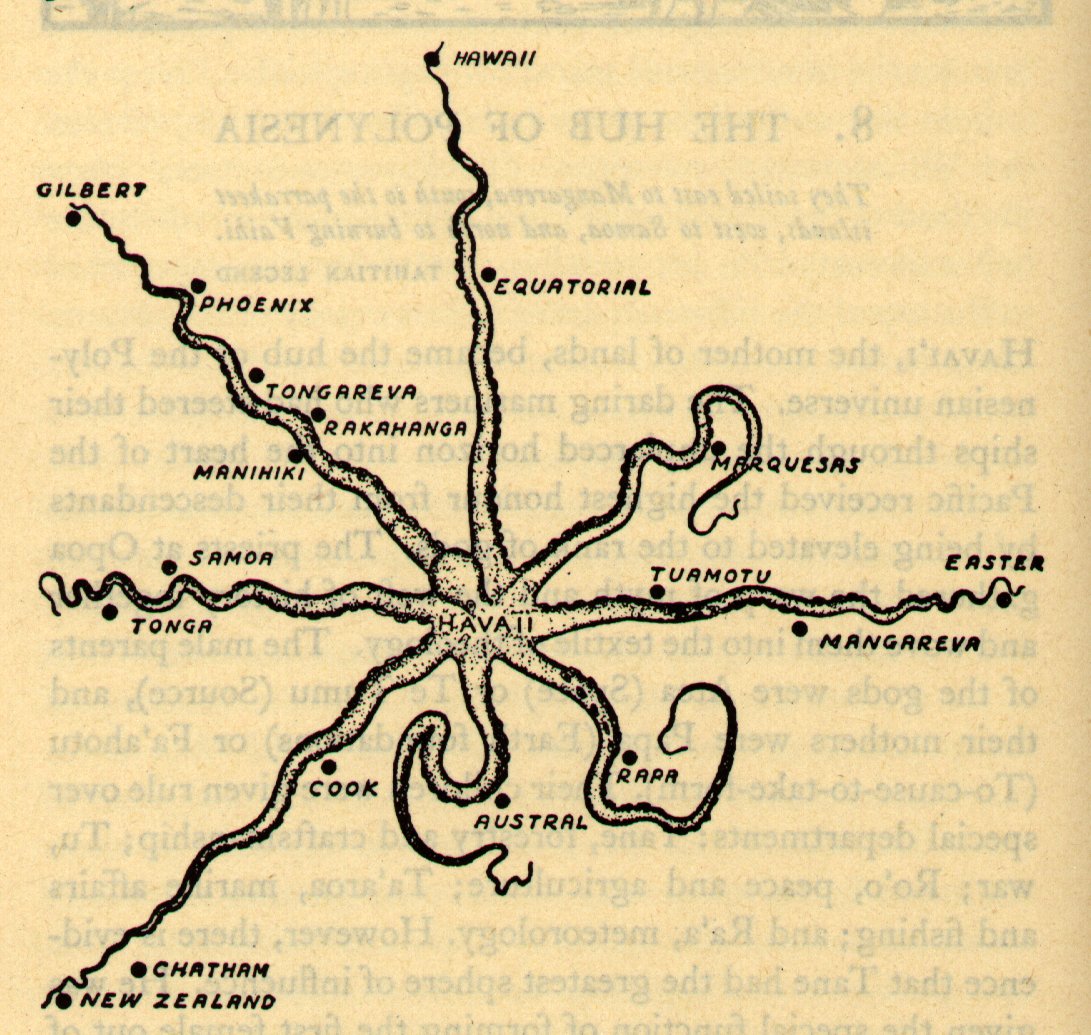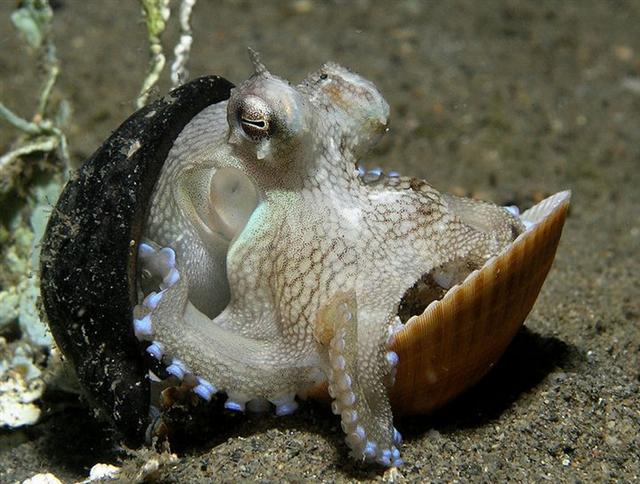The stupid name Octans for the
constellation at the southern
pole originates from the ideas
following in the wake of the
industrial revolution. But the
name anyhow reveals the Octopus
hiding in the background:

|
Heke
(Heke),
hakaheke, to
pull down, to
overthrow. Mgv.:
akaeke, to
overthrow, to
vanquish; heke,
to fall down, to
fall to pieces:
akaheke;
akahekeheke, to
demolish. Mq.:
heke, to
crumble, to fall
down; hakaheke,
to demolish, to pull
down. Churchill.
Kai heke,
hakaheke, to
deflower.
Kahukahu o heke,
an octopus hiding in
his ink.
Mq.: ve'eve'e
'tentacules du heke'.
Barthel 2.
Pau.: Heke,
to purge. Mgv.:
heke-toto,
hemorrhage. Ta.:
hee, to purge.
Mq.: heke, to
drip. Ma.: heke,
id. Pau.:
Hekeheke,
elephantiasis. Ta.:
feefee, id.
Mq.: fefe,
id. Sa.: fe'efe'e,
id. Mgv.: Heke,
eke, octopus.
Ta.: fee, id.
Mq.: heke,
feke, fee,
id. Sa.: fe'e,
id. Ma.: wheke,
id. Ta.: Hee,
to slide, to swim.
Sa.: se'e, to
slide, to shoot the
breakers. Ha.:
hee, id. Mq.:
Hee oto, to cut.
Sa.: sele,
id. Ha.: helehele,
id. Churchill.
Ma.: 1. Migrate.
Islands of History.
2. Rafter.
Starzecka. |
The firstborn son of Hotu
a.Matua was Tuu ma Heke
and we can guess Tuu
could have been an allusion to
the old Babylonian Ku (Tu).
The Hawaiians have ku
where other islands tend to have
tu, which opened up
possibilities for word play.
|
BABYLONIAN ECLIPTIC
CONSTELLATIONS: |
|
1 |
1-iku |
Field measure |
τ
(Anunitum)
Pisces |
16.5 |
April 6 (96) |
|
2 |
Mahrū-sha-rishu-ku |
Front of the Head of
Ku |
β (Sheratan),
γ (Mesarthim)
Arietis |
27.4 |
April 17 (107) |
|
3 |
Arku-sha-rishu-ku |
Back of the Head of
Ku |
α (Hamal)
Arietis |
30.5 |
April 20 (110) |
|
4 |
Temennu |
Foundation Stone |
η (Alcyone)
Tauri |
56.1 |
May 16 (136) |
|
Tuu
1. To
stand erect. 2.
Mast, pillar, post.
Van Tilburg.
1.
To stand erect,
mast, pillar, post;
tuu noa,
perpendicular;
tanu ki te tuu,
to set a post;
hakatu tuu, to
step a mast; tuu
hakamate tagata,
gallows; hakatuu,
to erect, to
establish, to
inactivate, to form,
immobile, to set up,
to raise. P Mgv.,
Mq., Ta.: tu,
to stand up. 2. To
exist, to be. Mgv.:
tu, life,
being, existence. 3.
To accost, to hail;
tuu mai te vaka,
to hail the canoe.
Mgv.: tu, a
cry, a shout. 4. To
rejoin; tuua
to be reunited. 5.
Hakatuu,
example, mode,
fashion, model,
method, measure, to
number. PS Sa.:
tu, custom,
habit. Fu.: tuu,
to follow the
example of. 6.
Hakatuu, to
disapprove;
hakatuu riri, to
conciliate, to
appease wrath. 7.
Hakatuu, to
presage, prognostic,
test. 8. Hakatuu,
to taste. 9.
Hakatuu, to
mark, index, emblem,
seal, sign, symbol,
trace, vestige, aim;
hakatuu ta,
signature; akatuu,
symptom; hakatuua,
spot, mark;
hakatuhaga,
mark; hakatuutuu,
demarcation.
Churchill.
1.
To arrive:
tu'u-mai. 2.
Upright pole; to
stand upright (also:
tutu'u). 3.
To guess correctly,
to work out (the
meaning of a word)
correctly:
ku-tu'u-á koe ki te
vânaga, you have
guessed correctly
[the meaning of] the
word. 4. To hit the
mark, to connect (a
blow). 5. Ku-tu'u
pehé, is
considered as... ;
te poki to'o i te
me'e hakarere i roto
i te hare, ku-tu'u-á
pehé poki ra'ura'u,
a child who
takes things that
have been left in
the house is
considered as a
petty thief. Tu'u
aro, northwest
and west side of the
island. Tu'u
haígoígo, back
tattoo. Tu'u
haviki, easily
angered person.Tu'u-toga,
eel-fishing using a
line weighted with
stones and a hook
with bait, so that
the line reaches
vertically straight
to the bottom of the
sea. Tu'utu'u,
to hit the mark time
and again.
Tu'utu'u îka,
fish fin (except the
tail fin, called
hiku). Vanaga.
... To the
Polynesian and to
the Melanesian has
come no concept of
bare existence; he
sees no need to say
of himself 'I am',
always 'I am doing',
'I am suffering'. It
is hard for the
stranger of alien
culture to
relinquish his nude
idea of existence
and to adopt the
island idea; it is
far more difficult
to acquire the
feeling of the
language and to
accomplish elegance
in the diction under
these unfamiliar
conditions. Take for
an illustrative
example these two
sentences from the
Viti: Sa tiko na
tamata e kila:
there are (sit) men
who know. Sa tu
mai vale na yau:
the goods are
(stand) in the
house. The use of
tu for tiko
and of tiko
for tu would
not produce
incomprehensibility,
but it would entail
a loss of finish in
diction, it would
stamp the speaker as
vulgar, as a white
man ... Savage life
is far too complex;
it is only in rich
civilization that we
can rise to the
simplicity of
elemental concepts
... Churchill 2. |
|
Ma
(Prep.) for (found
in some cases
instead of mo).
Vanaga.
1.
And, with, in
addition. P Pau.:
ma, together
with. Mgv.: ma,
for, with. Mq.:
ma, and. Ta.:
ma, and, with.
(... we may say of
ma that it
points to the
non-ego and not-here
and links it to the
central concept of
that which is active
and present ... we
should hold the
consonantal value as
carrying the
linking,
conjunctive,
associative sense;
the shade of variety
in meaning would be
found to exist as
the nucleus of the
e and of the
o
respectively -
Churchill 2) 2.
Shame; hakama,
shame, confusion,
timid, to blush,
bashfulness. P Pau.:
mataki,
shame. Mgv.:
akama, shame,
bashfulness,
modesty, shy. Mq.:
maamaa,
ninny, simpleton.
Ta.: haama,
timidity, shameful,
confused. Churchill.
|
We know the northern star (hetu'u)
at the pole (tuu) rose in
front of Sheratan and possibly
there was also a close
connection between the southern
star at the pole in front of
some other significant star.
|
April 14 |
15 |
16 (106) |
 |
 |
 |
|
*Ca14-27 |
*Ca14-28 |
*Ca14-29 (392) |
|
te
henua |
te
honu |
te
rima |
|
no star listed (24) |
no star listed (25) |
POLARIS, Baten
Kaitos
(26.6),
METALLAH
(26.9) |
|
April 17 (107) |
18 |
19 |
 |
 |
 |
|
Cb1-1 (393) |
Cb1-2 |
Cb1-3 |
|
E tupu - ki
roto |
o te hau tea |
|
Al Sharatain-1 /
Ashvini-1 /
Bond-16 |
ι Arietis
(28.0), λ
Arietis (28.2) |
Alrisha, χ
Phoenicis
(29.2),
Alamak
(29.7) |
|
Segin,
Mesarthim,
ψ Phoenicis
(27.2),
SHERATAN,
φ Phoenicis
(27.4) |
... Becoming aware at
last of his own
existence and oppressed
by a yearning loneliness
Ta'aroa broke
open his shell and,
looking out, beheld the
black limitless expanse
of empty space.
Hopefully, he shouted,
but no voice answered
him. He was alone in the
vast cosmos. Within the
broken Rumia he
grew a new shell to shut
out the primeval void.
Eons passed and
Ta'aroa grew to be a
lad conscious of his own
vigor and
potentialities.
Impatience grew upon him
until he could bear his
isolation no longer. He
broke forth from his
shell with energy,
resolved to create
beings like himself who
would banish his
loneliness forever.
Ta'aroa's
first act was to
construct a firm
foundation for the
earth, using the strong
second shell for stratum
rock. The shell Rumia
became his dwelling
place, the overarching
dome of the sky. It was
a confined sky enclosing
the world just forming,
and in its deep and
abiding night the lad
attained manhood. There
were no Sun, Moon, or
stars and only one other
living creature, the
Great Octopus.
The sun was held down
close above the slowly
evolving earth by the
Great Octopus,
Tumu-rai-fenua,
Foundation of Heaven and
Earth, who lived in the
primeval waters on which
the earth floated.
One of his arms was to
the north, one to the
south, one to the east
and another to the west.
With these vast arms he
held the sky, the shell
Rumia, close down
against the earth.
Meanwhile on the earth
itself various
generations of rocks
were born, one after the
other; then sand
appeared. Roots were
born and as they spread
they held the sand
together and the land
became firm.
Ta'aroa
sat in his heaven above
the earth and conjured
forth gods with his
words. When he shook off
his red and yellow
feathers they drifted
down and became trees
...

|


